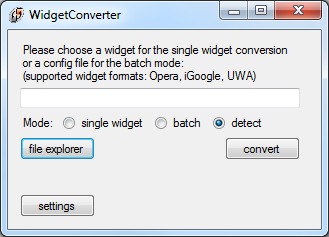W3C Widget Converter
Authors: Michael Hertel, Alexey Tschudnowsky, Martin Gaedke
Introduction
Currently the number of publicly available W3C Widgets is relative small compared to the large amount of iGoogle, Opera and Netvibes widgets. The goal of the W3C converter tool is to enable automatic conversion of proprietary widgets into W3C format. The tools currently supports Opera, iGoogle and Netvibes formats
Usage
The tool supports two modes: single conversion and batch conversion.

The single conversion lets user select a single widget file (e.g. Opera, iGoogle, UWA ) and parameterize the conversion process using a wizard dialog. The batch mode processes a bunch of input files based on a parameters defined in a dedicated configuration file. A log file is kept in the output directory
Single mode
Following parameters can be set in the single mode:
| Working Directory | Points to an output folder, which will contain the converted widgets. Each widget is placed into separate subfolder |
| Working Directory Name Length | Limits the length of the resulting output subfolder (for compliance to the path length restriction of Windows) |
| Apache Wookie Adaptation | Ensures that the resulting W3C widgets run in the Apache Wookie container. This implies the injection of the "widget.proxify" function, which enables cross-origin requests for widgets running in Wookie |
| Remove the iGoogle Analytics Feature | Removes “analytics” and “com.google.gadgets.analytics” iGoogle features |
Batch mode
Following parameters can be set in the configuration file for the batch mode:
| widgetinput | File path | Path to the source folder with widget packages |
| searchoption | “TopDirectoryOnly” or “AllDirectories” | Specifies if also subdirectories of the input folder should be processed |
| widgetoutput | File path | Path to the output folder for the converted W3C widgets |
| widgetoutputoverwrite | “true” or “false” | “true” to overwrite files in the output folder with the same name as input widget |
| widgetworkdelete | “true” or “false” | “true” to delete the working directory with internals of converted widgets. Only *.wgt package will be left. |
| widgetwidth | Positive Integer | Default widget width |
| widgetheight | Positive Integer | Default widget height |
Evaluation
To evaluate the tool we took 25 commonly used or best rated widgets from iGoogle, Opera and Netvibes platform. The functionality of the converted widgets has been verified manually after deploying them into an instance of Apache Wookie 0.9.2.
Opera widgets
For the Opera format we tested 35 widgets (10 of them didn’t run in the Opera widget environment). The application converted 21 of the 25 given Opera widgets into the W3C format. Two of them couldn’t be converted due to JavaScript API calls, which aren’t supported at the moment of the tool . Of the 21 successfully converted widgets only 13 worked with Apache Wookie (52%).
iGoogle
The tool converted all of the 25 selected iGoogle gadgets successfully. However, only 23 of the 25 generated widgets worked with Apache Wookie (92%)
Netvibes
To convert Netvibes widgets into W3C format we first exported them as Opera widgets. The application converted all 25 widgets successfully. From the converted widgets 22 worked in Apache Wookie. (88%)
Download
Requirements: .NET Framework 4
W3C Converter (ZIP-Archive with Executable)For more information please have a look into Michael Hertel's Bachelor Thesis (only German)

